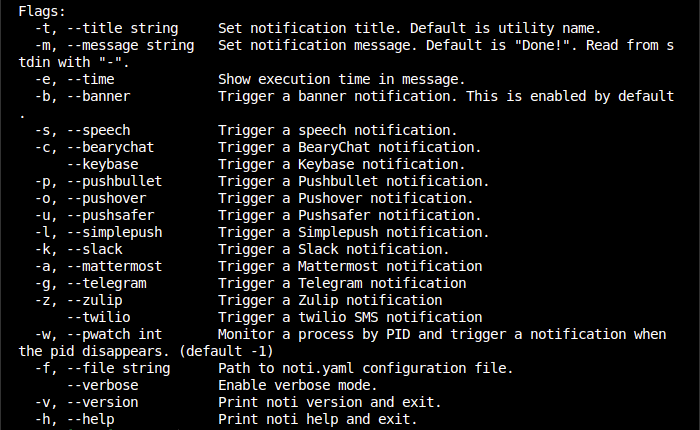In Operation
We always seem to be installing software written in the Rust programming language. There are so many useful utilities written in Rust these days. Often the best way to install Rust software is with Cargo, the Rust package manager.
Even relatively small Rust-based projects take some time to compile as a project often pulls in a ton of dependencies. Monitoring the terminal for this process to complete isn’t a boon to productivity.
For example, to build imager, a tool for automated image compression, cargo has to compile almost 400 crates. That build process takes a while to complete even on a reasonably modern PC. Step forward noti.
To be notified when the build of imager is complete, we prepend noti to cargo:
$ noti cargo install imager
When the build process is complete, noti outputs a desktop notification. In our case, that’s a GNOME notification

If all that noti did was emit desktop notifications, it wouldn’t be terribly useful. What makes noti really useful is that can trigger notifications for different services, and even monitor a process by PID. Here’s a list of the available options and how they are triggered.

noti is useful for any command-line task that’s not quick to complete. We’re regularly using it for backups made with tar.
We often use the command-line for many day-to-day tasks such as installing/updating system-wide packages. In the case of Manjaro, the project actually recommends using the command-line for large updates instead of their own GUI tool.
As we test a huge range of software many of which are available in the Arch User Repository (AUR), we use yay, an AUR helper, if only because it installs/updates both packages in the Official Repositories and the AUR. We can simply install a pre-defined set of packages using yay together with an install script.
Given the number of packages we install on our test systems, and that packages in the AUR have to be compiled, an install/update can take a long time. It’s helpful to be notified when the process is completed without having to monitor the progress.
When the packages updates are completed, noti’s notification is sent to our desktop.

Summary
noti is a very useful utility and feels at home in our Excellent utilities series.
While it supports a good range of notification services, we’d love to see this extended. Obvious candidates include Gotify, XMPP, Discord, Teams, IRC, and lots of others.
Website: github.com/variadico/noti
Support:
Developer: variadico
License: MIT License
noti is written in Go. Learn Go with our recommended free books and free tutorials.
Pages in this article:
Page 1 – Introduction / Installation
Page 2 – In Operation / Summary
Complete list of articles in this series:
| Excellent Utilities | |
|---|---|
| AES Crypt | Encrypt files using the Advanced Encryption Standard |
| Ananicy | Shell daemon created to manage processes’ IO and CPU priorities |
| broot | Next gen tree explorer and customizable launcher |
| Cerebro | Fast application launcher |
| cheat.sh | Community driven unified cheat sheet |
| CopyQ | Advanced clipboard manager |
| croc | Securely transfer files and folders from the command-line |
| Deskreen | Live streaming your desktop to a web browser |
| duf | Disk usage utility with more polished presentation than the classic df |
| eza | A turbo-charged alternative to the venerable ls command |
| Extension Manager | Browse, install and manage GNOME Shell Extensions |
| fd | Wonderful alternative to the venerable find |
| fkill | Kill processes quick and easy |
| fontpreview | Quickly search and preview fonts |
| horcrux | File splitter with encryption and redundancy |
| Kooha | Simple screen recorder |
| KOReader | Document viewer for a wide variety of file formats |
| Imagine | A simple yet effective image optimization tool |
| LanguageTool | Style and grammar checker for 30+ languages |
| Liquid Prompt | Adaptive prompt for Bash & Zsh |
| lnav | Advanced log file viewer for the small-scale; great for troubleshooting |
| lsd | Like exa, lsd is a turbo-charged alternative to ls |
| Mark Text | Simple and elegant Markdown editor |
| McFly | Navigate through your bash shell history |
| mdless | Formatted and highlighted view of Markdown files |
| navi | Interactive cheatsheet tool |
| noti | Monitors a command or process and triggers a notification |
| Nushell | Flexible cross-platform shell with a modern feel |
| nvitop | GPU process management for NVIDIA graphics cards |
| OCRmyPDF | Add OCR text layer to scanned PDFs |
| Oh My Zsh | Framework to manage your Zsh configuration |
| Paperwork | Designed to simplify the management of your paperwork |
| pastel | Generate, analyze, convert and manipulate colors |
| PDF Mix Tool | Perform common editing operations on PDF files |
| peco | Simple interactive filtering tool that's remarkably useful |
| ripgrep | Recursively search directories for a regex pattern |
| Rnote | Sketch and take handwritten notes |
| scrcpy | Display and control Android devices |
| Sticky | Simulates the traditional “sticky note” style stationery on your desktop |
| tldr | Simplified and community-driven man pages |
| tmux | A terminal multiplexer that offers a massive boost to your workflow |
| Tusk | An unofficial Evernote client with bags of potential |
| Ulauncher | Sublime application launcher |
| Watson | Track the time spent on projects |
| Whoogle Search | Self-hosted and privacy-focused metasearch engine |
| Zellij | Terminal workspace with batteries included |
